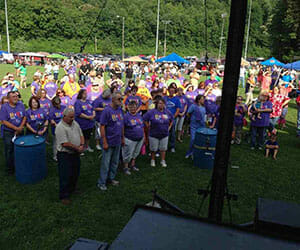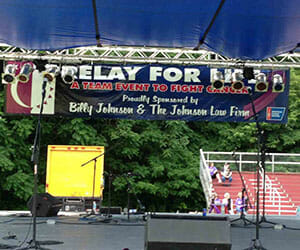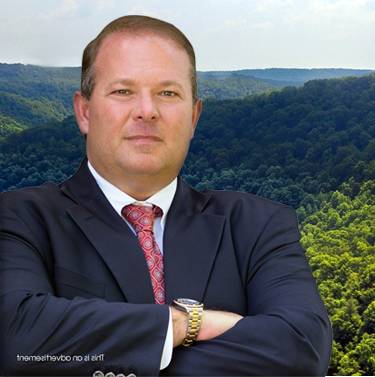The American Cancer Society (ACS) estimates that more than 1.6 million new cases of cancer will be diagnosed this year. Prostate cancer is the most common cancer among men (26 percent), followed by lung (14 percent), and colon and rectum (8 percent) cancers. Among women, breast (29 percent), lung (13 percent), and colon and rectum (8 percent) cancers are the most common cancers. While there have been notable improvements in survival rates for most cancer types due to earlier detection and/or advances in treatment, there still will likely be almost 589,500 U.S. cancer deaths in 2015.
Cancer is the second most common cause of death in the US, exceeded only by heart disease, and accounts for nearly 1 of every 4 deaths.
Since 1913, the ACS has been working to save lives by helping people stay well and get well, by finding cures, and by fighting back. One of its biggest programs under the fighting-back umbrella is the Relay for Life. With 4 million people across the globe participating in more than 6,000 Relay for Life events each year, it is the ACS’s most successful fundraiser. In general, an event consists of teams who camp out overnight and take turns walking or running around a track or path at a local high school, park or fairground. Events are up to 24 hours long, and because cancer never sleeps, each team is asked to have at least one participant on the track at all times. Although Relays may vary, common features include:
- A Survivor Lap, which starts the Relay event
- A Caregiver Lap
- An Opening Lap, in which all teams walk together
- A Luminaria Ceremony, usually with a candlelight vigil
- A Closing Ceremony, including a final lap for all participants. Awards are given to teams for various achievements, such as most laps walked and most money raised.
- A “Fight Back” Ceremony, in which participants pledge to take action and spread awareness of cancer research, treatments and prevention.

 Because we all have had family members and friends who have been touched by cancer, the staff of the Johnson Law Firm is intensely passionate about working toward a cure. Since opening the firm, Team Billy Johnson has participated in the American Cancer Society’s Relay for Life throughout Eastern Kentucky. In fact, the firm has been a Relay sponsor for the past 6 years. We are also sponsors of the stage where all the entertainment and announcements happen throughout the night in Pikeville. The Johnson Law Firm recognizes that the Relay is a team effort, and appreciates the involvement and support of everyone at the firm. We are particularly proud of Cody Pauley Johnson, who served as Luminaria and Sponsorship chairperson from 2010 to 2013, and co-chaired the entire event with Jennifer Brown-Day in 2014 and 2015.
If you have any questions about this topic, you can find out more by discussing it with one of the attorneys at the Pikeville, KY-based Johnson Law Firm. Contact us by calling 606-437-4488 or through our online form.
Because we all have had family members and friends who have been touched by cancer, the staff of the Johnson Law Firm is intensely passionate about working toward a cure. Since opening the firm, Team Billy Johnson has participated in the American Cancer Society’s Relay for Life throughout Eastern Kentucky. In fact, the firm has been a Relay sponsor for the past 6 years. We are also sponsors of the stage where all the entertainment and announcements happen throughout the night in Pikeville. The Johnson Law Firm recognizes that the Relay is a team effort, and appreciates the involvement and support of everyone at the firm. We are particularly proud of Cody Pauley Johnson, who served as Luminaria and Sponsorship chairperson from 2010 to 2013, and co-chaired the entire event with Jennifer Brown-Day in 2014 and 2015.
If you have any questions about this topic, you can find out more by discussing it with one of the attorneys at the Pikeville, KY-based Johnson Law Firm. Contact us by calling 606-437-4488 or through our online form.



 William “Billy” Johnson grew up in the Dorton area of Pike County, Kentucky, and early on decided to stay in the beautiful Appalachian mountains. Like many others in Eastern Kentucky, Billy’s dad worked as a coal miner, a hard job but one that taught his son how to meet challenges head on and persevere. Attorney Billy Johnson has years of experience helping injured clients with claims such as car, truck, and motorcycle accidents, wrongful deaths, work injuries, and more. [
William “Billy” Johnson grew up in the Dorton area of Pike County, Kentucky, and early on decided to stay in the beautiful Appalachian mountains. Like many others in Eastern Kentucky, Billy’s dad worked as a coal miner, a hard job but one that taught his son how to meet challenges head on and persevere. Attorney Billy Johnson has years of experience helping injured clients with claims such as car, truck, and motorcycle accidents, wrongful deaths, work injuries, and more. [ 



